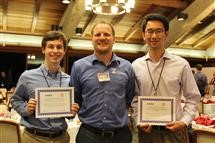Nathan Brooks and Zichao Ye Win Best Paper Awards at IEEE COMPEL 2017
Nathan Charles Brooks and Zichao Ye, advisees of associate professor Robert Pilawa-Podgurski, each received a best paper award at the 2017 IEEE Workshop on Control and Modeling for Power Electronics (COMPEL) hosted by Stanford University. COMPEL consists of keynote speeches, workshops, lectures and individual submissions and is known for renowned researchers in the field of power electronics. Two of the five Best Paper Awards (out of 198 presentations) were awarded to CEME students.
Nathan’s paper, “Control Design of an Active Power Pulsation Buffer Using an Equivalent Series-Resonant Impedance Model,” co-authored by Shibin Qin, derives and validates a new ac to dc power converter control method, which will lead to higher efficiency and smaller size. Applications range from datacenters and electric vehicles, to LED lighting. Brooks received his electrical engineering BS from Rose-Hulman Institute of Technology in 2016, and is in his second year at Illinois pursuing his PhD in electrical engineering. As an engineer, he enjoys the practical application of science on real-world problems, and power electronics “constantly satiates his desire to explore and learn diverse and challenging ideas.”
Ye’s paper, “Investigation of Capacitor Voltage Balancing in Practical Implementations of Flying Capacitor Multilevel Converters,” co-authored by Yutian Lei and Zitao Liao, investigates the capacitor voltage imbalance issue of the popular multi-level power converter topology. Key applications benefiting from Ye’s research discoveries are power converters for electric vehicles such as cars and future aircraft, along with high efficiency data centers. Ye received his bachelor’s degree in 2014 from ECE ILLINOIS and is now in his fourth year pursuing his PhD in electrical engineering. He likes power electronics because of its interdisciplinary nature and hands-on approach to engineering. He states, “the world is always going to have continued power needs, and power electronics is a subject that requires very broad understanding and intersects many disciplinary areas. Knowledge of circuit design, control, electromagnetics, and thermal management are just some of many fields necessary to address power electronics design from a system perspective.”
Brooks said that studying with Professor Pilawa, “we get the chance to work on some exciting projects realizing and improving the design of electric aircraft, data center power delivery, and solar-photovoltaics amongst others, which even now begin to dramatically affect people’s lives.” Ye added, “It is my great pleasure to work in this amazing research group… and as everyone is so hard-working, you will never find the labs uninhabited.”
Professor Pilawa-Podgurski was thrilled to see his students’ work recognized. He concludes, “COMPEL is the top power electronics control conference in the world, and it is a great opportunity for the students to share the results of their work with the leaders of our field. Nathan and Zichao worked very hard to not only perform research at the highest level, but also to clearly present their results in both written and oral communication. It is always great when such efforts are noticed by our peers, and it encourages us to keep pushing for excellence in research.”
Taken from an article by Joseph Park, ECE ILLINOIS

Comments - No Responses to “Nathan Brooks and Zichao Ye Win Best Paper Awards at IEEE COMPEL 2017”
Sorry but comments are closed at this time.